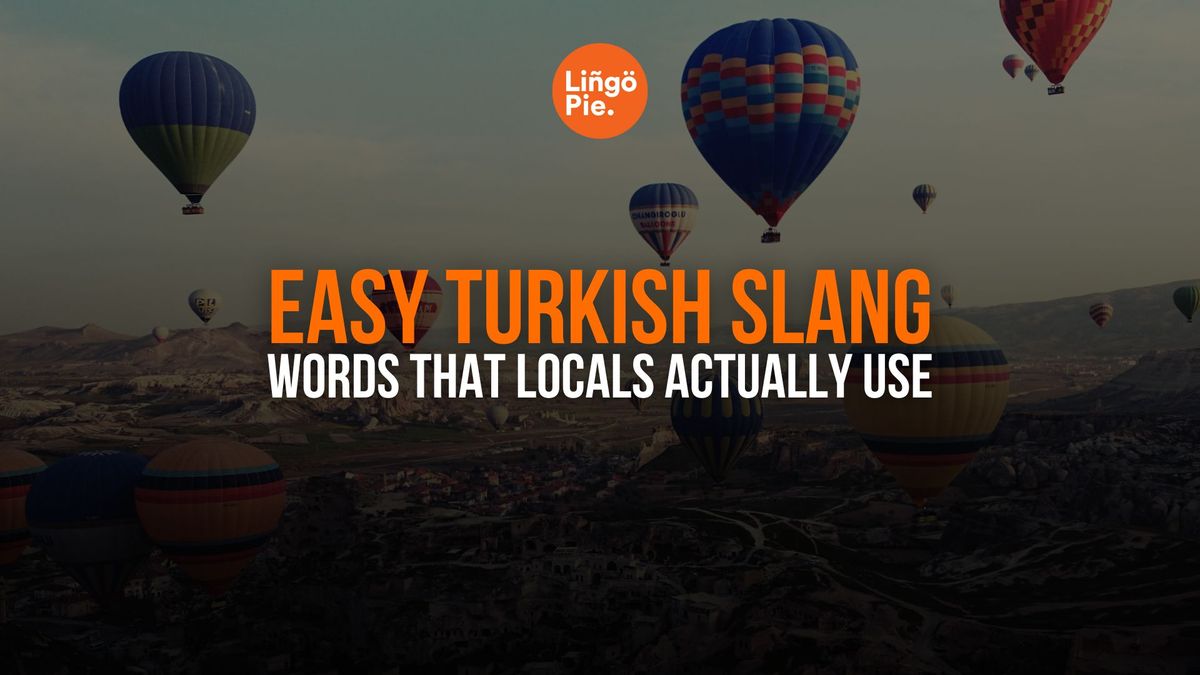As a Turkish native, I can tell you that Turkish slang hits DIFFERENT from what you'll find in those standard language textbooks. While mastering formal Turkish is great, knowing a few slang words can make you sound more like a local and less like someone who just stepped off the tourist bus.
Ready to spice up your Turkish vocabulary with some authentic street talk? In this post, I'm sharing 20 super easy Turkish slang expressions we use daily in our conversations. Whether you're planning a trip to Istanbul or just want to learn Turkish so you can understand TV shows better, these casual phrases will help you sound more natural when chatting with locals like me.
- 15+ Best Ways To Say Thank You In Turkish Language
- 10 Curse Words In Turkish To Sound Like A Native
- Christmas In Turkey: How To Say Merry Christmas In Turkish?

Common Turkish Slang Words
1. Lan
An informal exclamation used to express surprise, frustration, or to grab someone’s attention. It's often used in casual conversations between friends or acquaintances. It can also be used to add emphasis or show disbelief. While it can be a bit rude depending on the context, it's typically harmless when used among friends.
Example: Ne yapıyorsun lan? (What are you doing, man?)
2. Kanka
Meaning: "Buddy" or "dude."
This is a term of endearment used for close friends or buddies, similar to calling someone your "bestie" in English. It’s an affectionate way of addressing someone with whom you share a close bond. You wouldn’t typically call someone “kanka” if you didn’t know them well, as it’s meant for people you feel comfortable with.
Example: Kanka, akşam dışarı çıkalım mı? (Buddy, should we go out tonight?)
3. Naber
Meaning: Informal "What’s up?" or "What’s going on?"
It’s a casual greeting used to ask someone how they are or what they’re doing. It's the kind of phrase you'd use when catching up with friends.
Example: Naber, her şey yolunda mı? (What’s up? Everything okay?)

4. Kazıklamak
Meaning: To overcharge someone or scam them.
When someone charges way more than they should or tricks you into paying more than necessary, “kazıklamak” is used to describe the act of being overcharged or scammed.
Example: Bizi fena kazıkladılar. (They totally ripped us off.)
5. Ekmek
Meaning: To stand someone up.
Don't be confused here because “ekmek” as a noun means "bread," but as a verb, it means leaving someone waiting. It’s commonly used among friends to explain a situation where someone stands them up. This means not showing up for plans without prior notice or explanation.
Example: Beni dün akşam ekti. (They stood me up last night.)
6. Tuzlu
Meaning: Pricey or expensive.
It literally means “salty” in Turkish, but when used in slang, it refers to the high cost of something. You might use it to describe a meal, an item, or any service that feels overpriced. It’s often used to express surprise or dissatisfaction with the price of something.
Example: Bu restoran çok tuzlu. (This restaurant is very expensive.)
7. Beş parasız
Meaning: Broke or penniless.
“Beş parasız” literally translates to "without five pennies." It's a way to describe someone who is financially drained or out of money, often used humorously to lighten the situation. This phrase is used when someone has no money or is financially struggling.
Example: Bu ay beş parasız kaldım. (I’m broke this month.)
8. Hayırdır?
Meaning: "What gives?" or "What’s up with that?"
When you use “hayırdır,” it implies that something is strange or unexpected, and you're questioning the behavior. It’s often used when you’re in a situation where you feel something is off.
Example: Hayırdır, neden böyle bakıyorsun? (What gives, why are you looking at me like that?)

9. Akşamdan kalmak
Meaning: Hangover.
Just like “hangover” in English, “akşamdan kalmak” specifically refers to the physical state the morning after excessive drinking, typically characterized by headaches and nausea.
Example: Dün gece çok içtik, akşamdan kalmayım. (We drank a lot last night; I’m hungover.)
10. Takma kafana
Meaning: "Shake it off" or "never mind."
This is a comforting phrase that suggests not stressing over something small. It’s a way to dismiss problems and move on with the conversation or situation.
Example: Boşver, takma kafana. (Forget it, don’t sweat it.)
11. Hadi oradan!
Meaning: "You gotta be kidding me!" or "Yeah, right!"
This phrase is used when someone tells you something that sounds unbelievable or exaggerated. It’s similar to saying “No way!” in English.
Example: Hadi oradan! Buna kim inanır? (You gotta be kidding me! Who would believe that?)
12. Racon kesmek
Meaning: Swagger or to settle disputes.
This slang phrase is used when someone is trying to show off or assert authority in a situation, often in a dominant or controlling way. “Racon kesmek” can also refer to the act of being in charge or showing leadership in a group, but often in a way that comes across as bold or brash.
Example: Mahallede racon kesiyor. (He’s laying down the law in the neighborhood.)
13. Enayi
Meaning: Sucker or dupe.
This word refers to someone who is easily deceived or taken advantage of, often used to call someone a fool for trusting or believing something easily.
Example: Enayi yerine koyma beni. (Don’t take me for a fool.)

14. Dandik
Meaning: Cheapo or low-quality.
This slang is used when something doesn’t live up to expectations or is seen as subpar. It’s often used for products that are not worth the money.
Example: Bu telefon çok dandik. (This phone is so crappy.)
15. Mal
Meaning: Dumb or idiot.
This word can be quite insulting and should only be used among friends or in a context where it’s understood as playful teasing. It’s never a word for polite company.
Example: Bu kadar mal olma, lütfen. (Don’t be such an idiot, please.)
16. Oha
Meaning: Whoa or wow.
This is an expression of surprise or shock, often used when something is extraordinary or unbelievable. Similar to the English “Whoa!” or “No way!” it’s an expression of surprise that’s used when you see or hear something shocking or amazing.
Example: Oha! Bu fiyat çok fazla! (Whoa! That price is too much!)
17. Gıcık
Meaning: Annoying or irritating.
It’s used to describe a person, situation, or thing that bothers you. When something or someone is frustrating or gets on your nerves, you can describe it as “gıcık.” It’s commonly used in informal, everyday conversations.
Example: Bu adam çok gıcık ya! (This guy is so annoying!)
18. Harbi
Meaning: For real, seriously.
It's used to emphasize that something is genuine or true, similar to saying "no joke" in English. "Harbi" is used to emphasize that you're speaking sincerely or to stress that something is exactly as it seems. It's often used to underline the truth of a statement.
Example: Harbi güzel bir filmmiş. (It’s seriously a great movie.)
19. Kaybol
Meaning: "Get lost!" or "Go away!"
It’s a blunt and direct way to tell someone to leave you alone or leave a place. While it’s very direct and could be seen as rude, it’s often used when you’re frustrated or annoyed with someone. It’s like telling someone to “scram” in English.
Example: Hadi kaybol buradan! (Get lost from here!)
20. Oley
Meaning: Yay or hooray!
This word is used to express excitement or celebration. It's often said when something good or fun happens, like getting good news or achieving something. It’s a happy, energetic expression used to celebrate positive moments, similar to shouting “Woo-hoo!” or “Yay!” in English.
Example: Tatildeyiz, oley! (We’re on vacation, yay!)
Why Learn Turkish Slang Words?
Turkish slang is essential for genuine communication. Formal Turkish works for business and academics, but slang is what you'll hear in daily conversations, social media, and entertainment. It's the language that helps you understand rapid-fire conversations between Turkish friends, casual YouTube videos, and social situations.
More importantly, slang reveals social dynamics that formal language misses. The way someone addresses you - whether formally or with slang - instantly signals their comfort level and intentions. These expressions carry cultural context that can make the difference between basic communication and actually fitting in with Turkish speakers.
When To Use Turkish Slang Words?
Turkish slang works best in casual, everyday situations. Use it with friends your age, in text messages, and on social media. These expressions also fit perfectly in cafes, at parties, or when chatting with peers - but save the formal Turkish for business meetings and conversations with elders.
The key is knowing your audience. Young Turks use slang freely on Instagram, TikTok, and in daily chats, while professional or formal settings call for standard Turkish. A good rule: if you're comfortable enough to joke around with someone, you can probably use slang with them.
Tips For Using Turkish Slang
I highly recommend starting slow and listening first. Notice how locals use these expressions - their timing, tone, and who they're speaking with. Dropping every slang word you know into one conversation isn't natural. Instead, pick up common phrases and use them when you hear others doing the same.
Most importantly, pay attention to the social setting. Young Turks might use different slang than middle-aged speakers, and some expressions can be too casual for certain situations. Also, remember that slang changes quickly - what's popular today might be outdated next year. Checking Turkish social media or asking Turkish friends can help you stay current with the latest expressions.
- 26+ Easy Guatemalan Slang Every Expat Should Know
- 25 Modern French Text Slang and Chat Abbreviations
- 20 German Slang Words & Phrases You Need to Learn
Ready To Level Up Your Turkish?
Turkish slang opens up a whole new way of connecting with the language and its people. While we're putting the finishing touches on our Turkish content at Lingopie, you can start exploring our other language offerings. We've got the same kind of real-world, practical learning approach waiting for you in Spanish, French, German, and more.

And hey, keep an eye out - Turkish is coming to Lingopie soon! You'll be able to learn these slang expressions (and much more) through fun TV shows and movies that Turkish people actually watch.
Frequently Asked Questions About Turkish Slang
Is Turkish slang hard to learn?
Turkish slang is actually quite straightforward once you understand basic Turkish. Most slang expressions follow regular Turkish grammar patterns, and many are simply shortened versions of formal words. The real challenge isn't memorizing the words but learning when and how to use them appropriately in conversations.
What's the most common Turkish slang word?
"Kanka" (buddy/bestie) is arguably the most widely used Turkish slang word across all age groups. It's a friendly, casual way to address close friends and has become so mainstream that even older generations have started using it. You'll hear this word everywhere from school corridors to social media posts.
How different is Turkish slang from standard Turkish?
Turkish slang mostly consists of standard Turkish words that have taken on new meanings or been shortened for casual use. While formal Turkish is more structured and precise, slang often breaks grammar rules, drops syllables, and uses metaphorical meanings. However, the basic language structure remains the same.
Can I learn Turkish slang from Turkish TV shows?
Yes, Turkish TV shows, especially modern series and youth-focused programs, are excellent resources for learning current slang. Popular shows like "Çukur," "Behzat Ç," and "Leyla ile Mecnun" are particularly good for picking up authentic Turkish slang in context.
How do I avoid offensive Turkish slang?
The best approach is to learn slang from trusted native speakers or reliable language resources. Some Turkish slang can be very informal or even rude in certain contexts. Start with common, neutral expressions and always ask about the appropriateness of a slang term before using it in conversation.





![How To Use Reflexive Verbs in Spanish [Guide]](/blog/content/images/2025/01/How-To-Use-Reflexive-Verbs-in-Spanish.jpg)
![6 Best Portuguese Documentaries To Learn Portuguese [Guide]](/blog/content/images/size/w1200/2025/01/Portuguese-Documentaries-To-Learn-Portuguese.jpg)



